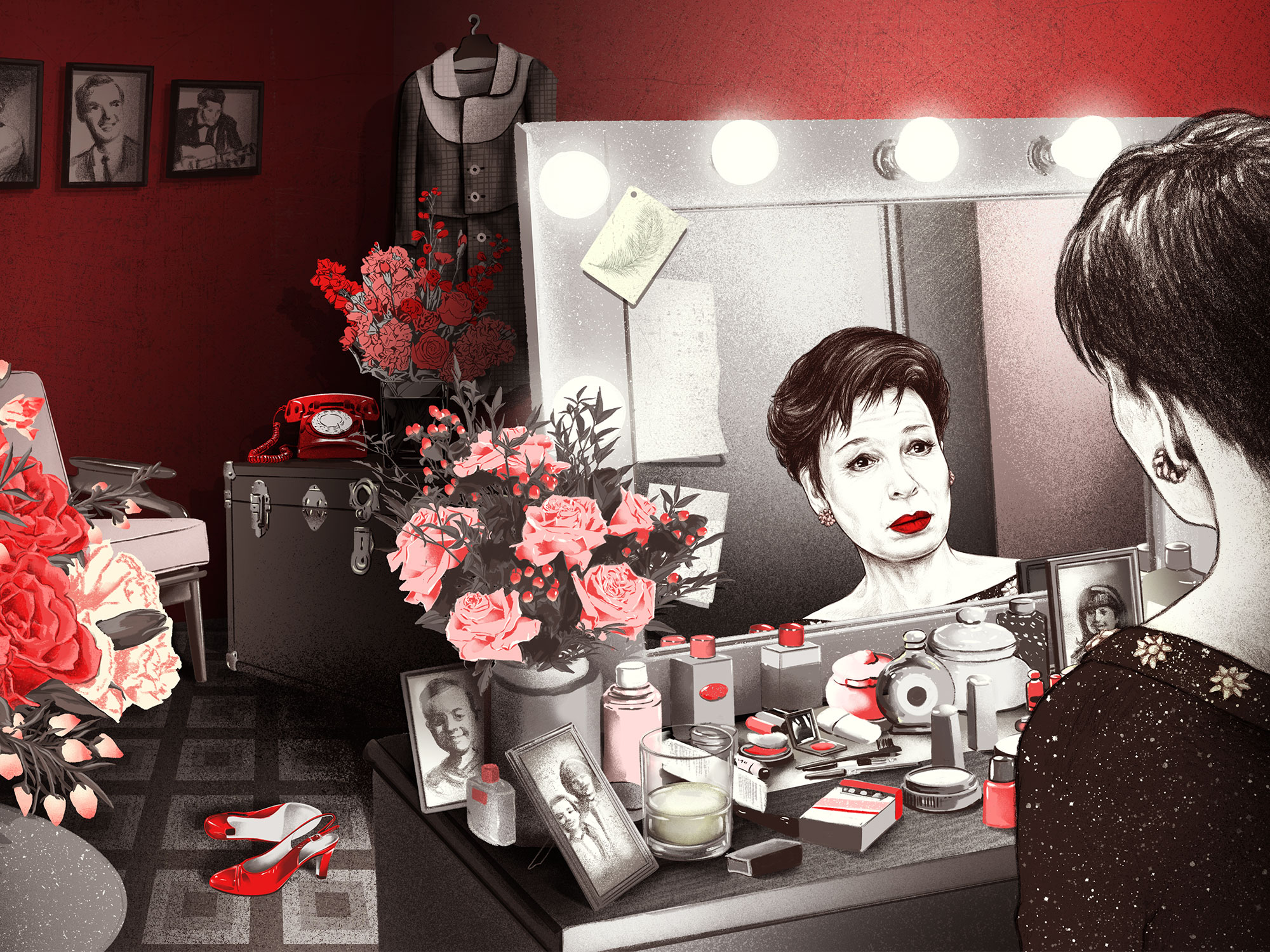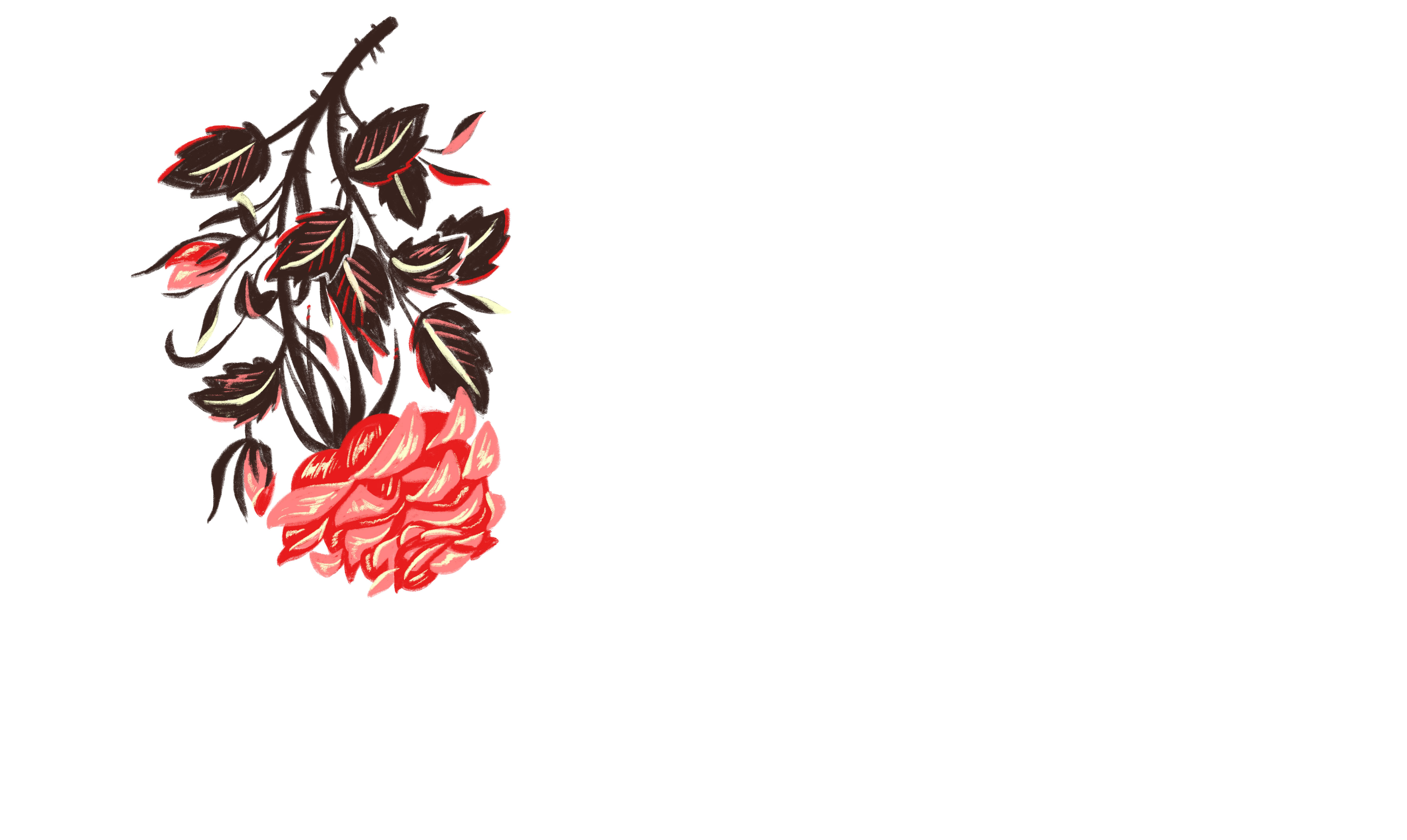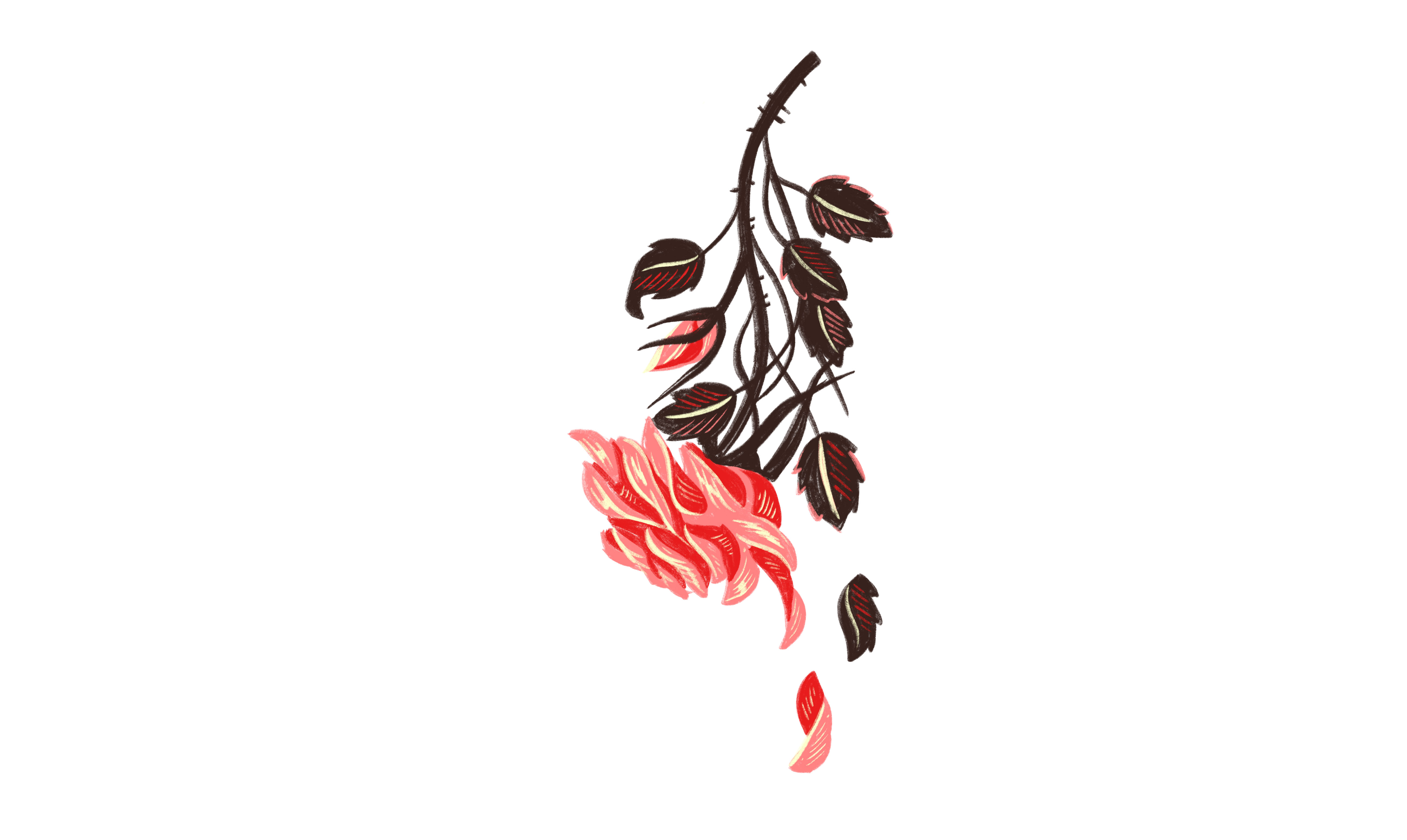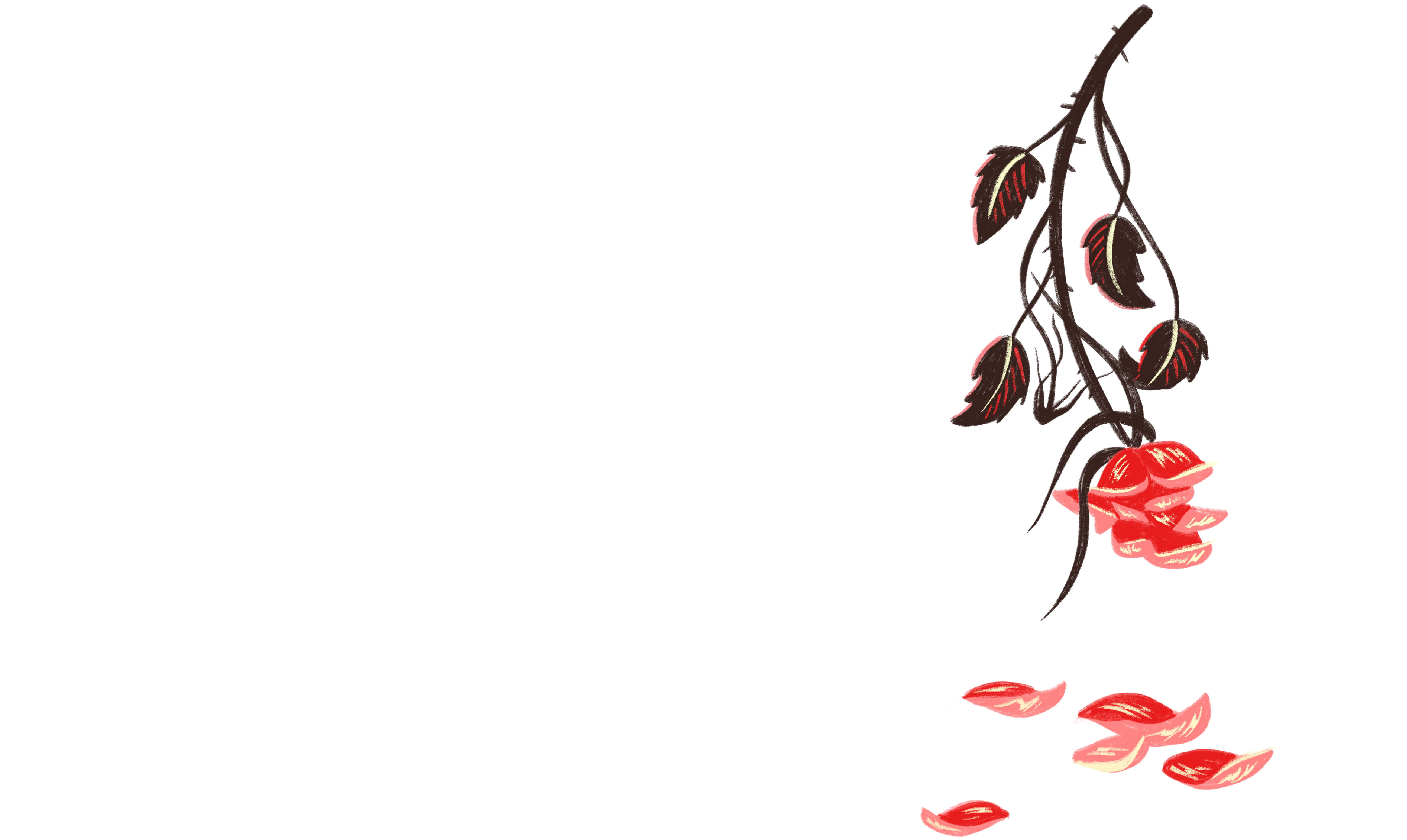Renée Zellweger: ‘There was a moment where I started to recognise that I didn’t recognise myself’

Film critics have a habit, and not an especially good one, of describing biographical performances as a kind of magic trick, a vanishing act. We marvel at the “transformative” process that turns one famous person, for two hours or so, into another. We describe their crafty, makeup-aided mimicry as “uncanny”, a kind of supernatural channeling. And we speak of actors “disappearing” into these roles, as if the true mark of a great performance is our failure to see the artist behind it.
It’s a perception that pervades the industry itself, winning glittering prizes on a near-annual basis for highly recognisable actors doing their best to make themselves less so: Gary Oldman’s latex-swaddled Winston Churchill, Meryl Streep’s starched-and-pressed Maggie Thatcher, Rami Malek’s bucktoothed, lip-synching Freddie Mercury.
Yet some of the most vivid biopic turns aren’t disappearing acts at all. Think of Faye Dunaway’s once-denigrated high-camp Joan Crawford in Mommie Dearest: an extraordinary, emulsified fusion of both legends’ challenging hauteur and hard-ass glamour, no more recognisable as one than the other. Or Diana Ross playing Billie Holiday in Lady Sings the Blues, the Motown diva’s baby-doll look and Canderel voice intact, and both miles away from those of the tortured jazz goddess – and yet, somehow, they feel emotionally true to her pain. Not every actor needs to lose themselves in the person they’re playing; sometimes finding yourself in them can work just fine.
This thought repeatedly came to mind while watching a resurgent Renée Zellweger take on the daunting task of inhabiting Judy Garland in Judy, Rupert Goold’s bittersweet late-life biopic. The performance is gutsy, funny, stirring: an against-odds coup from an actor who wouldn’t have been first on many people’s lists to play Hollywood’s greatest (and most tortured) show-woman. It is absolutely not a slavish act of impersonation, despite dazzling contributions from the costume, hair and makeup teams: Zellweger may artfully approximate Garland’s brassy, marmalade-thick timbre and glitchy-electric stage presence, but so many details of this portrait – that blinking, quizzical gaze, that short, purposeful gait – are uniquely her own.
If they’re so easy to identify as hers, it’s because we missed them for some time. Zellweger has been officially “back” for three years, having ended a six-year hiatus in 2016 with a sprightly return in her signature role as hapless London diarist Bridget Jones, as if no time had passed at all. But it had. Her absence was a disruptive one in a career that, since the mid-’90s, had ploughed on more or less non-stop through Oscar-gilded prestige films, mall-friendly comedies and the odd off-piste indie, all playing in different ways on Zellweger’s grounded, Texan-sweetheart charm, even when she was airlifted far from the Lone Star state.
Zellweger seemed too comforting, too consistent, too reliable a movie star to just go AWOL on us for more than half a decade. Fans and journalists were disconcerted enough by the break that, when she did return, she was scrutinised cruelly for differences – hair, body, face – as if she may have been some kind of imposter. And yet she was breezily back on the beat in Bridget Jones’s Baby: older, of course, but game and gawky as ever. It was a cautious, canny, reassuring choice of return vehicle, but Judy feels like the real, hard-graft comeback. It is the performance that has truly been born of her absence, and whatever she learned of herself in that time.

I catch Zellweger quite literally off-balance when I arrive to meet her. She’s hopping around a satiny Knightsbridge hotel suite, wearing one bright, sky-high stiletto sandal and trying to wrestle her way into the other one – but its fiercely orange straps won’t quite comply, and she makes a sheepish just-a-second gesture as she gives up the jig, sitting down to adjust the recalcitrant shoe.
It’s the kind of entrance – a spot of everyday pratfalling to undercut an otherwise immaculate, champagne-hued outfit – that you might script for Bridget Jones, or even a glamorous movie star playfully wanting to appear a bit more real. But Zellweger, pleasantly serious and soft-spoken in person, isn’t the mugging type. “I’m afraid I don’t really wake up for another four hours,” she says deadpan, having only touched down in London from Los Angeles the night before. “I hope I know what to say.” She laughs drily, looking around the vast, plush hotel room as if searching for inspiration.
Such luxury chambers can be distressingly blank spaces in which to conduct interviews, but here it feels apt: so much of Judy takes place in Garland’s similarly cushioned London suite, a deceptively opulent sanctuary for a broke diva loath to admit she doesn’t have a home of her own. Zellweger can’t relate. She is a professed homebody who has a nest in Los Angeles that kept her occupied in the six years she took off from acting. (She enjoys a little carpentry, she tells me.) Not having to live perennially on sets and out of suitcases during that time was a life-changer; the projects she makes now have to earn that disruption. “I’m just a little more stringent about that now,” she says. “Earlier in my career, I’d think how my life could fit around the movies, and now it’s the other way round.”
Which brings us back to Garland, who never got to make that call for herself. With repeated flashbacks to the starlet’s teenage years under the oppressively controlling, contract-bound wing of studio boss Louis B Mayer, Goold’s film shows a girl being put on a draining showbiz treadmill from which she hasn’t escaped by the final months of her life in 1969. This is where Zellweger’s gnarled, still-defiant performance finds her.
“The system was very different then, obviously,” Zellweger says, “and so she didn’t have the opportunity to participate in determining her professional fate. Or even to be made aware of her finances, and how she was being commodified and exploited. Certainly, she assumed that because everything else was sorted and decided for her, that meant she was being managed properly in terms of her wealth and her well-being. And what a shame that it was just not so.”
It’s a situation, she says, akin to the tragedy of Amy Winehouse, and as I nod in agreement, something she said a minute before bounces back to us at the same time. How different is the system today? Aren’t vulnerable performers – women, in particular – still being exploited to the point of ruin by the powers that be? “Yes, absolutely.” She sighs. “For anyone coming into this industry, the circumstances are so foreign. And you find yourself needing help with things that you never anticipated. Things where life was completely manageable before, it becomes impossible to find balance and safety, and especially self-care. It’s just this train that’s running at a deadly speed, and you don’t know that everyone around you has your best interests at heart. And meanwhile, you probably don’t always make great choices either.”
The way Judy frames Garland’s story feels thoughtfully attuned to the #MeToo age of reflection and reform: it shows how deep-rooted the iniquities and inequalities behind the movement are. The teenage Garland (played by Darci Shaw) is portrayed as a coldly micromanaged studio property, ceaselessly criticised by her minders for being pretty or skinny enough, and placed on an escalating diet of pills to manage her moods and waistline alike.
It’s a story of abuse slightly different from the testimonies emerging in this post-Weinstein era, but it’s not hard to draw a line from one to the other. It’s with this unhappy legacy in mind that Zellweger sees Hollywood’s current inquiry not as a startling lightbulb moment, but as a long-brewing catharsis. “Of course some of it shocked me,” she says. “Because some of the folks that surfaced and had been accused – you know, I was very surprised. But no, this has long been a part of this industry, and every other.”

With an increased understanding of the oppression Garland faced, then, comes a shift in the direction of blame for her downfall. Judy sounds a rejoinder to the convenient tabloid myth that casts ruined female stars – from Garland then to Winehouse now – as “self-destructive”, instead unpicking the layers of individual and systemic mistreatment that contributed to her demise, and the ways in which she attempted to fight it. It’s a reclamation of her narrative, I suggest, if not an entirely happy one. “There’s so much more to the story than just her missteps,” Zellweger agrees. “It’s not properly contextualised in most recollections about what had happened. It seems like it’s so much more fun to talk about the negativity, or the disaster, rather than say, ‘Wait a second,’ to look at her humanity, and recognise the circumstances that led there are not only by her own hand.”
Which isn’t to say she’s presented without agency either: Zellweger had little interest in playing Garland as pure victim. “I didn’t know, before taking this part, how extraordinarily sharp she was – just such a witty person,” she says. “I guess it’s impossible to deflect in the way that she did without having such keen intelligence. I really enjoyed watching the old footage of her, because she could hit the ball back like nobody. So I don’t know if vulnerable is the right word, but she wanted to connect, it seemed to me. And of course, there’s always someone who might take advantage of that want. In Judy’s case, that happened quite a lot.”
It’s not the first time she speaks of Garland’s experience with sad, knowing sympathy. As much research as Zellweger did into her life and work, it’s hard not to suspect that 25-odd years in Hollywood have prepared her for this role in ways that can’t be looked up, or found in grainy archive footage. “I’m sure there are experiences I’ve had that sadly made her circumstances a little easier to understand,” she says quietly. “There’s a lot in between the lines, and it’s not referenced very often by her critics: those intimate moments where you oscillate between being the famous person and being the private person. That’s something I’ve known.”
Zellweger was 26, with a few promising indies under her belt and some grunt work in Texas Chainsaw Massacre: The Next Generation (alongside an equally unformed Matthew McConaughey) behind her, when Cameron Crowe cast her in her star-making role as single mother Dorothy Boyd – the irresistibly earnest, earthbound foil to Tom Cruise’s cocky eponymous sports agent – in the 1996 smash Jerry Maguire. She was young, then, but had been chasing the dream long enough that stardom didn’t seem a fait accompli to her. (By the time Garland was 26, the glare of the Hollywood lights had already pushed her to a nervous breakdown and a suicide attempt.)
Success snowballed. Before the decade was out, she was sharing top billing with the likes of Meryl Streep and Jim Carrey, attracting paparazzi attention with her engagement to the latter. The 2000s were busier still. Bridget Jones’s Diary brought her solo star clout, the first of three consecutive Oscar nominations – she won on the third, for her rootin’ tootin’ farmhand Ruby Thewes in Anthony Minghella’s Cold Mountain – and less desirably, the enduring fixation of tabloid media on her waistline. These weren’t developments she’d bargained for. Who could? Zellweger grimaces. “It was a difficult thing for me initially, because the things that I valued the most disappeared overnight. And so I had to learn to be comfortable with the new reality of having a public ‘persona’.”
She puts the last two words in such audible quotation marks that I wonder if she ever did get comfortable with it. Is this the “public persona” I’m seeing now? Is the mask on? She laughs. “It’s not so much a front as a set of skills you’re not born with, that enable you to navigate the peculiarity of the circumstances that you find yourself in,” she says. “And the peculiarity of the job, which actually seems very normal from the inside, but the projections are fantastic. But it’s constantly evolving, it’s always a surprise.”
By the end of the 2000s, however, the job wasn’t evolving to Zellweger’s liking: her work schedule was as busy as ever, but the work itself wasn’t bringing her much pride or joy. Elegant mainstream entertainments like 2002’s Chicago and 2003’s Down with Love – the delightful, Doris Day-referencing rom-com she affectionately cites as the film of hers she’d most like audiences to revisit – had given way to outright junk like 2009’s New in Town and the inadvertently riotous horror Case 39, from the same year. (Its inauspicious tagline: ‘Some cases should never be opened.’) Meanwhile, independent projects in which she was more invested – like 2010’s My Own Love Song, an oddball Deep South Europudding in which Zellweger crooned Bob Dylan as a wheelchair-bound folk singer – barely got released at all.
Cue the hiatus, which she chose to take even as scripts continued to come in. “It was absolutely necessary. It was just time. I mean, I was exhausted when I went to make Chicago. I needed to stop then, and I just didn’t for years. Because you think, ‘Eat your ice cream while it’s on your plate.’ And it was really nice ice cream. Once in a lifetime, dream-come-true experiences, and I didn’t stop to…” She interrupts herself, thinking a second. “Well, that was all more important at the time.”
She leans in, oddly animated on the subject of her stasis. “There was a moment where I started to recognise that I didn’t recognise myself. Physically, I saw the chaos on the outside that was on the inside. I didn’t rest. I didn’t live anywhere. I didn’t have a relationship. Most of my closest friends – or people whom I shared my closest experiences with, anyway – were people who worked with me. That was not a healthy road to be on. And I needed to stop.”
Her craft, she felt, was suffering as much as her personal life. “I was bored of myself,” she shrugs. “I had been living in other characters’ lives, in other people’s spaces and costumes, looking like other people for a decade and a half, I guess, without stopping. And there’s not much to draw from in life experience, to tell human stories, when you haven’t been living as yourself. And not only does that frankly make for boring performances – all regurgitated emotion that you’ve lived a million times as another character – but I was bored with myself as a person too.”
I bring up a term she mentioned earlier with regard to Garland: self-care. Is that how she saw her break? “Oh, absolutely. Physically, emotionally, all of that.” She found a house and began fixing it. She took road trips to see family scattered across the country from her Texas hometown to the cool northeast. She wrote and developed a TV series, Cinnamon Girl, about young girls coming of age in 1960s Hollywood: it wasn’t picked up, but she cheerfully maintains that it had something. She took on personal study projects and rescue dogs. (“200 pounds of them,” she grins, when I ask how many.) She was, she gradually realised, happy.
Zellweger is mindful of the privilege that permitted her this break, and with that awareness, she always intended to go back to work eventually. “It’s not as if I don’t recognise the rarity of the circumstances, and the privilege of the opportunities I’m given: I’m not going to be cavalier about them. They came at great cost. But now I recognise that there are boundaries that are permissible. Or that I’ve made permissible.” She has learned, she says, the power of saying no, and feels more powerful for it.

What makes her say yes, then? “Oh, it’s always the same thing.” A good part is a good part, still. But has she emerged a different actor from the wilderness? “I’m sure I am,” she says. “But that’s just age, too. As for everyone, with the passage of time, you grow and learn and tolerate, or navigate things that you wouldn’t choose to. But I think I did return with a slightly different perspective. Because there are people in this business who come to depend on you, and you don’t want to let them down. And now I appreciate that there’s a way that I can be responsible to them, and still include myself in the equation. And not let my health be last.”
For all the work yet to be done, she sees Hollywood as gradually growing into a better place for women than it was when she temporarily left it. “Well, it’s inevitable,” she says. “You know, younger generations of women are starting to just do. And the internet has enabled so many not to wait around to be invited. And so they’re just going to continue to produce wonderful material. And folks are going to find value in it.” She, meanwhile, has producing plans of her own. “I’m active in it all,” she says, clamming up on the details. “It’s just quiet, you know, because you don’t talk about it until it’s time.”
Relaxation has made Zellweger more open to risk in other ways: 2019 has brought her first lead role in a TV series, Netflix’s high-trash, hoot-and- a-half soap opera What/If, in which she plays venal, manipulative San Francisco venture capitalist Anne Montgomery, icily ruining lives while wearing the hell out of crisply cut business-bitch couture. “Isn’t it the most fun?” she cackles when I bring it up, lightly stamping her feet in glee. It is, though you suspect she’s having even more – it’s the most against-type she’s ever played.
More so, even, than as Judy Garland, who has a common thread with many of Zellweger’s best-loved screen performances: the unassuming Dorothy in Jerry Maguire, who feels out of place in her lover’s high-flying world; striving starlet Roxie Hart in Chicago, who determines to win the spotlight through notoriety when her talent isn’t enough; or eternal shambles Bridget Jones, who must go through a parade of klutzy humiliations to be loved (or at least liked very much) just the way she is. Zellweger excels at playing women either not quite comfortable in their skin, or the skin that others impose on them, and who find ways to triumph anyway – even if, in Garland’s case, the suffering and glory were inseparable.
I ask Zellweger if she gravitates toward underdogs, and am met with a surprised blink. “I don’t know, I never saw it that way,” she says after a moment’s consideration. The question, admittedly, feels silly in Zellweger’s current presence: she seems as contented and comfortable in her skin as can be. She’s so persuasively, rivetingly agonised in Judy that it’s honestly a relief to see her like this, though she claps her hands when I say I see plenty of Renée Zellweger in her Judy Garland: “That’s what we wanted,” says, explaining that she and Goold were both resistant to the idea of impersonation. “We feared that the more you veer away from what is authentically you, the less likely you are to connect with the person you’re representing.”
Judy Garland had a more gruelling understanding than most of the way the spotlight – adoring and excoriating in equal measure – could wear a star down, though she was never permitted any time out of it; battle-worn but restored, Zellweger plays her with the palpable understanding of one who knows how hard it is to be looked at for so long. Much intricate cosmetic work has gone into making her credible as Judy Garland for two hours, yet the performance isn’t “transformative” in the hoary Spitting Image sense: the most striking change here is to the actress’s own gutsy, defiant resolve on camera. Renée Zellweger disappeared on us for six years. She can’t vanish before our eyes again.
The post Renée Zellweger: ‘There was a moment where I started to recognise that I didn’t recognise myself’ appeared first on Little White Lies.
![Forest Essentials [CPV] WW](https://s3-us-west-2.amazonaws.com/pcw-uploads/logos/forest-essentials-promo-codes-coupons.png)
0 comments